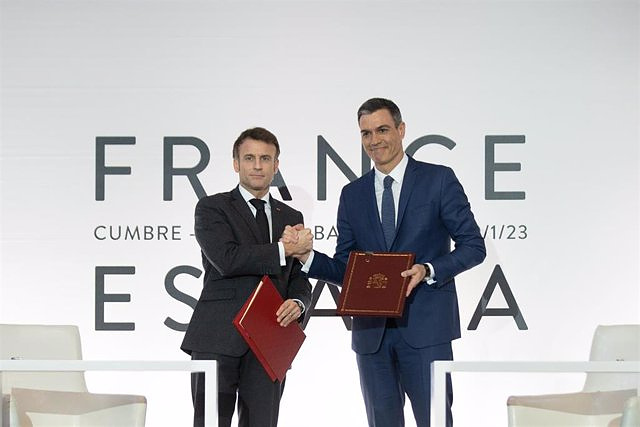There will be a working group for migration issues and the creation of binational operational units will be considered
BARCELONA, 19 Ene. (EUROPA PRESS) -
The Treaty of Friendship and Cooperation signed this Thursday by Spain and France contemplates intensifying contacts between the two countries to seek a "common front" in the European Union and international relations, with constant relations between both governments and even periodic 'exchanges' in the respective Councils of Ministers.
The document has been signed by the presidents Pedro Sánchez and Emmanuel Macron during the XVIII Spanish-French Summit in Barcelona, who have valued the "historic" of the moment, since it is the first treaty of this type despite the intensity of the bilateral relationship. According to Macron, this "anomaly" had to be solved.
The treaty includes various mechanisms to strengthen cooperation, such as the annual holding of bilateral summits or contacts between the different ministries. Also, the Treaty establishes that a member of the Government of one of the parties will be invited to the Council of Ministers of the other party, at least once every three months and by rotation.
An important part is focused on the European Union, where both countries agree to maintain "close consultation" on community issues and the enlargement process of the European Union.
"Both at the political level and among senior officials, the parties will consult regularly before major European decisions on issues of common interest, in order to try to establish common positions and promote them jointly," the document reads.
In foreign policy, Spain and France agree that their diplomacy network share analyzes to promote common interests in regions such as the Mediterranean and Africa; in addition to the need to deepen ties with Latin America and the Caribbean. The Treaty thus contemplates periodic consultations between the ministers of Foreign Affairs and the reciprocal exchange of diplomats between both departments.
In the defense section, they confirm their commitment to NATO at the same time that they are committed to a "stronger" European defense, and point to cooperation also in the industrial field to achieve the interoperability of their Armed Forces, with common projects. For all this, there will be annual meetings of the Defense and Security Council, in which the heads of Foreign Affairs and Defense participate.
On the other hand, the treaty provides for the creation of a working group on migration issues in which "the services responsible for border management, migration, asylum, integration and the fight against illegal immigration networks" will participate, and which may be expanded in if necessary.
Likewise, both governments are committed to promoting "legal channels of migration, integration and social inclusion of regular migrants" and have agreed that their foreign and interior ministers meet periodically to "address the external dimension" of migration.
On the other hand, the text also contemplates "the deployment, where appropriate, of binational operational units" as well as "the carrying out of common or joint operations to combat human trafficking networks."
In matters of justice and the interior, it also highlights "the high degree of cooperation" between the security forces and bodies and the judicial and penal authorities of both countries and expresses the will to continue on this path, particularly through the anti-terrorist working groups and the existing anti-drug liaison.
With regard to the economy, the treaty provides that a bilateral economic and business forum be organized annually in collaboration with the CEOE and the French employers' association, as well as greater cooperation in the field of tourism, given the importance that this sector has for the economies of the two countries.
Spain and France have also agreed to give priority to energy interconnections and specifically reaffirm their commitment to develop the electrical interconnection projects and the H2Med hydrogen transport corridor "in an equitable manner and in accordance with European standards", according to the text.
They also indicate that they will collaborate with energy regulators and the European Commission to obtain the maximum amount of European financing -a maximum of 50% of the total cost- and facilitate its evaluation and deployment.
Both countries also consider transport and telecommunications interconnections a priority "including 5G corridors", and assure that they will promote projects to promote "safe, easy and sustainable" mobility of passengers and goods "within the framework of the Trans-European Transport Networks".
On the other hand, Spain and France are going to create a Cross-Border Cooperation Committee of a consultative nature, made up of representatives of both administrations, with the aim of monitoring the implementation of the Cross-Border Cooperation Strategy provided for in this treaty.
The agreement also mentions that they undertake to facilitate the recognition of health and medical titles in both countries and will encourage learning the neighbor's language and its use in daily life in cross-border spaces.
Likewise, there is an explicit commitment to reinforce cooperation in the educational and cultural field, which includes the promotion of Spanish and French on the other side of the Pyrenees, greater equivalence in university degrees and double obtaining of the French and Spanish baccalaureate. or the promotion of joint cultural projects, among others.
Lastly, in environmental matters, the two countries will support the recognition by the International Maritime Organization of a Particularly Sensitive Marine Area (ZMES) in the northwestern Mediterranean.
Also the formulation of proposals for new Sulfur Emission Control Zones (SECA) in the Atlantic and Nitrogen Emissions (NECA) in the Mediterranean for presentation to the International Maritime Organization.
They will also continue to cooperate to monitor and protect endangered species, especially the capercaillie and the bear population in the Pyrenees, promoting their coexistence with human activities.

 Exploring Cardano: Inner Workings and Advantages of this Cryptocurrency
Exploring Cardano: Inner Workings and Advantages of this Cryptocurrency Seville.- Economy.- Innova.- STSA inaugurates its new painting and sealing hangar in San Pablo, for 18 million
Seville.- Economy.- Innova.- STSA inaugurates its new painting and sealing hangar in San Pablo, for 18 million Innova.- More than 300 volunteers join the Andalucía Compromiso Digital network in one month to facilitate access to ICT
Innova.- More than 300 volunteers join the Andalucía Compromiso Digital network in one month to facilitate access to ICT Innova.-AMP.- Ayesa acquires 51% of Sadiel, which will create new technological engineering products and expand markets
Innova.-AMP.- Ayesa acquires 51% of Sadiel, which will create new technological engineering products and expand markets The PSOE is holding a Federal Committee this Saturday that will serve to close ranks with Sánchez so that he does not resign
The PSOE is holding a Federal Committee this Saturday that will serve to close ranks with Sánchez so that he does not resign The Ibex 35 closes the week at its highest since 2015 and is already looking at 11,200
The Ibex 35 closes the week at its highest since 2015 and is already looking at 11,200 RELEASE: Dogfy Diet leads in canine nutrition with revolutionary natural solutions
RELEASE: Dogfy Diet leads in canine nutrition with revolutionary natural solutions STATEMENT: Fernando Belasteguín Curarti ambassador in China
STATEMENT: Fernando Belasteguín Curarti ambassador in China How Blockchain in being used to shape the future
How Blockchain in being used to shape the future Not just BTC and ETH: Here Are Some More Interesting Coins Worth Focusing on
Not just BTC and ETH: Here Are Some More Interesting Coins Worth Focusing on UPV students build a prototype of a wooden house to move to Equatorial Guinea
UPV students build a prototype of a wooden house to move to Equatorial Guinea The UA opens the call for the Impulso 2024 Awards for the best innovative business initiatives
The UA opens the call for the Impulso 2024 Awards for the best innovative business initiatives ALI, virtual assistant from Alicante, internationally recognized by the OECD
ALI, virtual assistant from Alicante, internationally recognized by the OECD Retrópolis brings the golden age of video games and computing to the UPV
Retrópolis brings the golden age of video games and computing to the UPV A million people demonstrate in France against Macron's pension reform
A million people demonstrate in France against Macron's pension reform Russia launches several missiles against "critical infrastructure" in the city of Zaporizhia
Russia launches several missiles against "critical infrastructure" in the city of Zaporizhia A "procession" remembers the dead of the Calabria shipwreck as bodies continue to wash up on the shore
A "procession" remembers the dead of the Calabria shipwreck as bodies continue to wash up on the shore Prison sentences handed down for three prominent Hong Kong pro-democracy activists
Prison sentences handed down for three prominent Hong Kong pro-democracy activists ETH continues to leave trading platforms, Ethereum balance on exchanges lowest in 3 years
ETH continues to leave trading platforms, Ethereum balance on exchanges lowest in 3 years Investors invest $450 million in Consensys, Ethereum incubator now valued at $7 billion
Investors invest $450 million in Consensys, Ethereum incubator now valued at $7 billion Alchemy Integrates Ethereum L2 Product Starknet to Enhance Web3 Scalability at a Price 100x Lower Than L1 Fees
Alchemy Integrates Ethereum L2 Product Starknet to Enhance Web3 Scalability at a Price 100x Lower Than L1 Fees Mining Report: Bitcoin's Electricity Consumption Declines by 25% in Q1 2022
Mining Report: Bitcoin's Electricity Consumption Declines by 25% in Q1 2022 Oil-to-Bitcoin Mining Firm Crusoe Energy Systems Raised $505 Million
Oil-to-Bitcoin Mining Firm Crusoe Energy Systems Raised $505 Million Microbt reveals the latest Bitcoin mining rigs -- Machines produce up to 126 TH/s with custom 5nm chip design
Microbt reveals the latest Bitcoin mining rigs -- Machines produce up to 126 TH/s with custom 5nm chip design Bitcoin's Mining Difficulty Hits a Lifetime High, With More Than 90% of BTC Supply Issued
Bitcoin's Mining Difficulty Hits a Lifetime High, With More Than 90% of BTC Supply Issued The Biggest Movers are Near, EOS, and RUNE during Friday's Selloff
The Biggest Movers are Near, EOS, and RUNE during Friday's Selloff Global Markets Spooked by a Hawkish Fed and Covid, Stocks and Crypto Gain After Musk Buys Twitter
Global Markets Spooked by a Hawkish Fed and Covid, Stocks and Crypto Gain After Musk Buys Twitter Bitso to offset carbon emissions from the Trading Platform's ERC20, ETH, and BTC Transactions
Bitso to offset carbon emissions from the Trading Platform's ERC20, ETH, and BTC Transactions Draftkings Announces 2022 College Hoops NFT Selection for March Madness
Draftkings Announces 2022 College Hoops NFT Selection for March Madness



























